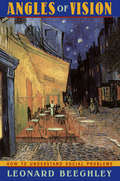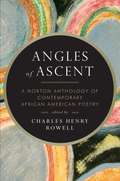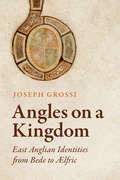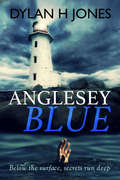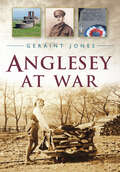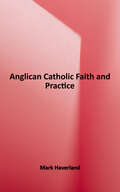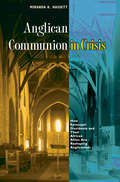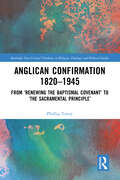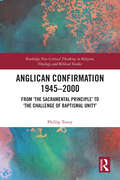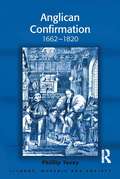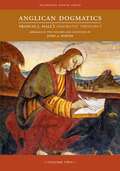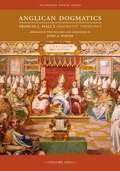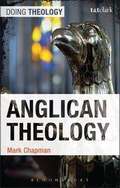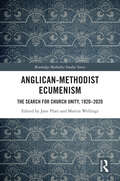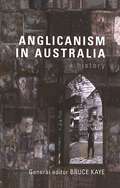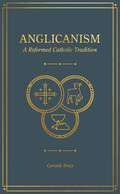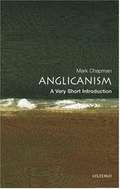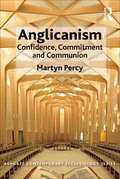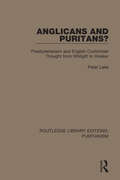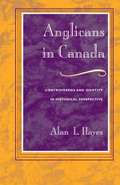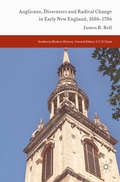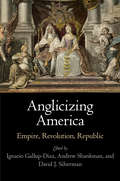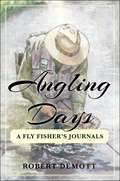- Table View
- List View
Angler: The Cheney Vice Presidency
by Barton GellmanGellman exposes the full scope of Cheney's work and its consequences, including his hidden role in the Bush administration's decisions to shift the focus from al Qaeda to Iraq, unleash the National Security Agency to spy at home, and promote "cruel and inhuman" methods of interrogation. 'Angler' describes Cheney as a man of deep conviction and remorseless will who reshaped his office and his times.
Angles Of Vision: How To Understand Social Problems
by Leonard BeeghleyAngles of Vision is a compact text that provides students with basic information about social problems and teaches them a strategy for understanding these issues. Students learn how to distinguish between individual and structural analyses and the importance of placing issues in a historical and international context to gain a clearer understanding. In so doing, students come to appreciate that sociology is a hypothesis-testing discipline. The author uses metaphors, vignettes, and humor to convey the fundamental concepts, key findings, and methods by which sociologists understand social problems. } Angles of Vision is a compact text that provides students with basic information about social problems and teaches them a strategy for understanding these issues. Students learn how to distinguish between individual and structural analyses and the importance of placing issues in a historical and international context to gain a clearer understanding. In so doing, students come to appreciate that sociology is a hypothesis-testing discipline. The author uses metaphors, vignettes, and humor to convey the fundamental concepts, key findings, and methods by which sociologists understand social problems.Each chapter is organized to facilitate students understanding. First the issue is presented. The reasons why it is considered a social problem are explained along with a brief history. Second, historical and international data on the issue are sketched, ordinarily in simple tables or figures. The historical data go back as far as plausible, usually a century or more. The international data usually compare the U.S. with Western European nations, such as the U.K., France, and others. Third, the consequences of the issue are discussed. Fourth, the way individuals affect and are affected by the problem is outlined. Fifth, the relationship between social structure and the problem is explained. Finally, the implications of the problem are reviewed. *Jargon-free writing style and use of humor and anecdotes clearly illustrate concepts and hold students interest. *Historical and international data provide students with a broader and more empirical basis with which to examine social problems. *Looks at social problems from different angles of vision such as individual or structural. *Emphasizes the importance of hypothesis testing.. Angles of Vision is a compact text that provides students with a strategy for understanding social problems.Ten readable chapters cover:abortion, gender inequality, racial and ethnic inequality, poverty, drugs, homicide, aging, health.Chapters begin with a brief outline of what is to follow, and end with a short list of further reading. Each chapter succinctly addresses the dimensions of the problem, its consequences, its effect on individuals, its effect on the social structure, and its implications. Key studies, comprehensive historical and comparative data, fundamental concepts, and key methods are explained using metaphors, vignettes, and humor that will draw your students in, while giving them a firm grounding in social problems. }
Angles of Ascent: Norton Anthology of Contemporary African American Poetry (First Edition)
by Charles Henry RowellMore than seventy poets are represented in this innovative new anthology of African American poetry since the 1960s.
Angles on a Kingdom: East Anglian Identities from Bede to Ælfric
by Joseph GrossiFrom the eighth century to the turn of the millennium, East Anglia had a variety of identities thrust upon it by authors of the period who envisioned a unified England. Although they were not regional writers in the modern sense, Bede, Felix, the annalists of the Anglo-Saxon Chronicle, King Alfred of Wessex, Abbo of Fleury, and Ælfric of Eynsham took a keen interest in East Anglia, especially in its potential to undo English cultural cohesiveness as they imagined it. Angles on a Kingdom argues that those authors treated East Anglia as both a hindrance and a stimulus to the development of early English "national" consciousness. Combining close textual reading with consideration of early medieval barrow burials, coinage, border delineation, and rivalries between monastic houses, Joseph Grossi examines various forms of cultural affirmation and manipulation. Angles on a Kingdom shows that, over the course of roughly two and a half centuries, the literary metamorphoses of East Anglia hint at the region’s recurring tensions with its neighbours – tensions which suggest that writers who sought to depict a coherent England downplayed what they deemed to be dangerous impulses emanating from the island’s easternmost corner.
Anglesey Blue (The DI Manx Cases #1)
by Dylan H. JonesAre you looking for an unmissable serial killer thriller? Then you'll love the best-selling Anglesey Blue. MURDER. BETRAYAL. REVENGE. It’s not the homecoming Detective Inspector Tudor Manx was expecting, but solving the case is just the start of his problems. Recently transferred from the London Met to the North Wales Constabulary, Detective Inspector Tudor Manx has come to the Isle of Anglesey hoping for a quiet life. But his hopes are dashed when a brutally mutilated body is found crucified to the bow of a fishing boat sending shockwaves through the peaceful community. Manx’s faces pressure to solve the case quickly equipped with an inexperienced team. Is the body a message or a premonition of more murders to come? Adding to his mounting problems, Manx’s troubled past returns to haunt him. Manx left the island after the disappearance of his younger sister, Miriam; a cold case that still remains unsolved. Can Manx solve the case before the body count rises? How will he cope when he is forced to choose between his family and his duty as a police officer? This is the first book in the thrilling new DI Tudor Manx series. Also now available in the DI Tudor Manx Series: Doll Face Dylan Jones is the best-selling author of Anglesey Blue. His books will appeal to fans of tense and gripping crime thrillers, as well as readers of authors like; Joy Ellis, Faith Martin and Robert Byrndza.
Anglesey at War
by Geraint JonesThe First and Second World Wars had a profound effect on all parts of Great Britain, and the comparatively isolated and rural island of Anglesey was no exception. Men were recruited and conscripted into the armed forces in large numbers and some parts of Anglesey, such as the port town of Holyhead, sprang to life. Many Anglesey men found themselves in exotic locations all across the world, while others lost their lives on the killing fields of Western Europe during the First World War. Many soldiers wrote letters home describing their experiences: good, bad and downright bizarre. Airships were deployed during the First World War and RAF airbases were established during the Second World War. The wars left a legacy that can still be seen on the island today.
Anglican Catholic Faith and Practice
by Mark HaverlandA succinct, yet thorough introduction to orthodox Anglican belief. Topics include authority in the church, the Bible, church history, the sacraments and worship, and Christian moral teaching.
Anglican Communion in Crisis: How Episcopal Dissidents and Their African Allies Are Reshaping Anglicanism
by Miranda HassettThe sign outside the conservative, white church in the small southern U.S. town announces that the church is part of the Episcopal Church--of Rwanda. In Anglican Communion in Crisis, Miranda Hassett tells the fascinating story of how a new alliance between conservative American Episcopalians and African Anglicans is transforming conflicts between American Episcopalians--especially over homosexuality--into global conflicts within the Anglican church. In the mid-1990s, conservative American Episcopalians and Anglican leaders from Africa and other parts of the Southern Hemisphere began to forge ties in opposition to the American Episcopal Church's perceived liberalism and growing toleration of homosexuality. This resulted in dozens of American Episcopal churches submitting to the authority of African bishops. Based on wide research, interviews with key participants and observers, and months Hassett spent in a southern U.S. parish of the Episcopal Church of Rwanda and in Anglican communities in Uganda, Anglican Communion in Crisis is the first anthropological examination of the coalition between American Episcopalians and African Anglicans. The book challenges common views--that the relationship between the Americans and Africans is merely one of convenience or even that the Americans bought the support of the Africans. Instead, Hassett argues that their partnership is a deliberate and committed movement that has tapped the power and language of globalization in an effort to move both the American Episcopal Church and the worldwide Anglican Communion to the right.
Anglican Confirmation 1820-1945: From ‘Renewing the Baptismal Covenant’ to ‘The Sacramental Principle’ (Routledge New Critical Thinking in Religion, Theology and Biblical Studies)
by Phillip ToveyThis book focuses on Anglican Confirmation in theology, liturgy, and practice from 1820 to 1945. This was a period of great change in the ways Anglicans approached Confirmation. The Tractarian movement transformed the Communion, and its ideas were carried overseas with the missionary movement. The study examines the development of a two-stage theology and its reception. It analyses the wave of liturgical revision expressed in England in the 1928 Prayer Book. It explores the episcopal changes in practice from the eighteenth-century paradigm to a new way of confirming. The revolution of the time has left a legacy that still informs practice, while doubts about theology and its liturgical application have left an existential crisis. The author reflects on how the current situation in various provinces has its roots in this period and the diffusion of ideas in the Communion. The book offers a fresh systematic examination of the neglected ecclesial practice of Confirmation, providing a more holistic view and clarifying developments to help us better understand the present. It will be of particular interest to scholars of Christian theology, liturgy, ecclesiology, and church history.
Anglican Confirmation 1945–2000: From ‘The Sacramental Principle’ to ‘The Challenge of Baptismal Unity’ (Routledge New Critical Thinking in Religion, Theology and Biblical Studies)
by Phillip ToveyThe focus of this book is the theology, liturgy and practice of Anglican Confirmation from 1945 to 2000. It is the third book in a series on Anglican Confirmation. The first chapters look at confirmation on a global and ecumenical level. How have questions about the place and performance of confirmation changed? Then there is a series of case studies from North America, Europe and the wider world. Two chapters are on the theology and practice of the Church of England. Attention is given to liturgical reform, theological discussion and practice, including statistics. In some chapters there are case studies of individual dioceses or bishops to give snapshots of theology in action. This book uses innovative visualization techniques to present data and uses textual network analysis to map the interrelationships of provinces at a liturgical level. The ecumenical ‘baptismal unity’ agenda from Vatican 2 and the World Council of Churches underlies the theological critique. This will be of great value to those in liturgical studies, church history, Anglican studies and to all bishops and clergy involved in confirmation.
Anglican Confirmation: 1662-1820 (Liturgy, Worship and Society Series)
by Phillip ToveyConfirmation was an important part of the life of the eighteenth-century church which consumed a significant part of the time of bishops, of clergy in their preparation of candidates, and of the candidates themselves in terms of a transition in their Christian life. Yet it has been almost entirely overlooked by scholars. This book aims to fill this void in our understanding, and offers an important contribution and correction of our understanding of the life of the church during the long eighteenth century in both Britain and North America. Tovey addresses two important historical debates: the 'pessimist/optimist' debate on the character and condition of the Church of England in the eighteenth century; and the debate on the 're-enchantment' of the eighteenth century which challenges the secular nature of society in the age of the Enlightenment. Drawing on new developments of the study of visitation returns and episcopal life and on primary research in historical records, Anglican Confirmation goes behind the traditional Tractarian interpretations to uncover the understanding and confidence of the eighteenth-century church in the rite of confirmation. The book will be of interest to eighteenth-century church historians, theologians and liturgists alike.
Anglican Dogmatics (Dogmatic Theology #2)
by Francis J. HallIN THIS VOLUME: <p><p>BOOK VI: The Incarnation <p>BOOK VII: The Passion & Resurrection of Christ <p>BOOK VIII: The Church & The Sacramental System <p>BOOK IX: The Sacraments <p>BOOK X: Eschatology <p><p> From the Prolegomena of the Editor: <p> The original advertisement for the publication of Francis J. Hall’s Dogmatic Theology in ten volumes by Longmans, Green and Company characterized it as “the long-desired Anglican Summa of doctrine, designed to constitute a connected treatment of the entire range of Catholic Doctrine,” making an implicit comparison to the magisterial Summa Theologicae (Summary of Theology) of St. Thomas Aquinas. The two are of roughly similar length, but it is in terms of comprehensiveness that the latter most resembles the former. Hall does for Anglicans what Aquinas did for Roman Catholics: systematize the contents of the Faith as taught by the Church and confirmed by the Scriptures. <p><p> Regrettably, this compendium of Anglican—and therefore, Catholic—doctrine is little known, and even less consulted, one hundred years after its publication. After more than twenty years in the priesthood, I would likely never have heard of it had not an Anglo-Catholic parishioner commended it to me. Its present obscurity is no doubt due to its being out of print for long periods, as well as to the unwieldiness of its 3,198 (!) pages. This slightly abridged and fully annotated edition is intended to remove both of these obstacles to its accessibility. <p><p> My editorial work has been primarily in service of slightly condensing the original to reduce it from ten compact tomes to two full-sized volumes, a goal made attainable in large part by typesetting and formatting changes. I have omitted text only in those rare instances when I judged it to be either unnecessarily redundant, overly technical, or anachronistic in illustration or application—or when Hall enters into debate with his contemporaries on some issue of the day. In all such cases, I have used ellipses enclosed in square brackets to indicate that material is missing. Whenever sentences or paragraphs seemed to me peripheral to the flow of Hall’s argument, tangential to the subject under discussion, or parenthetical in nature, but still important enough to retain, I have converted them into smaller-print footnotes as a means of conserving space. Headings for sections (marked with §) within chapters are taken from the original table of contents for each Book, and all paragraph divisions within the sections themselves have been eliminated. <p><p> For their part, the original footnotes have been drastically reduced in number and considerably shortened in length by eliminating all references to contemporaneous theological literature, on the assumption that the large majority of those sources, whatever their historical value, are likely to be of little interest to twenty-first-century readers, especially non-specialists. On the other hand, all cross-references and all attributions to (1) theologians of the undivided Church, (2) the works of medieval authors (especially Aquinas’s Summary), and (3) post-reformational English divines (such as Richard Hooker) have been retained as essential to the Catholic character of what I have called—in venturing a distinctive title for this abridgement—“Anglican Dogmatics.”
Anglican Dogmatics: Francis J. Hall's Dogmatic Theology
by Francis J Hall John A Porter Thomas HoltzenThe original advertisement for the publication of Francis J. Hall’s Dogmatic Theology in ten volumes by Longmans, Green and Company characterized it as “the long-desired Anglican Summa of doctrine, designed to constitute a connected treatment of the entire range of Catholic Doctrine,” making an implicit comparison to the magisterial Summa Theologicae (Summary of Theology) of St. Thomas Aquinas. The two are of roughly similar length, but it is in terms of comprehensiveness that the latter most resembles the former. Hall does for Anglicans what Aquinas did for Roman Catholics: systematize the contents of the Faith as taught by the Church and confirmed by the Scriptures. Regrettably, this compendium of Anglican—and therefore, Catholic—doctrine is little known, and even less consulted, one hundred years after its publication. After more than twenty years in the priesthood, I would likely never have heard of it had not an Anglo-Catholic parishioner commended it to me. Its present obscurity is no doubt due to its being out of print for long periods, as well as to the unwieldiness of its 3,198 (!) pages. This slightly abridged and fully annotated edition is intended to remove both of these obstacles to its accessibility. My editorial work has been primarily in service of slightly condensing the original to reduce it from ten compact tomes to two full-sized volumes, a goal made attainable in large part by typesetting and formatting changes. I have omitted text only in those rare instances when I judged it to be either unnecessarily redundant, overly technical, or anachronistic in illustration or application—or when Hall enters into debate with his contemporaries on some issue of the day. In all such cases, I have used ellipses enclosed in square brackets to indicate that material is missing. Whenever sentences or paragraphs seemed to me peripheral to the flow of Hall’s argument, tangential to the subject under discussion, or parenthetical in nature, but still important enough to retain, I have converted them into smaller-print footnotes as a means of conserving space. Headings for sections (marked with §) within chapters are taken from the original table of contents for each Book, and all paragraph divisions within the sections themselves have been eliminated. For their part, the original footnotes have been drastically reduced in number and considerably shortened in length by eliminating all references to contemporaneous theological literature, on the assumption that the large majority of those sources, whatever their historical value, are likely to be of little interest to twenty-first-century readers, especially non-specialists. On the other hand, all cross-references and all attributions to (1) theologians of the undivided Church, (2) the works of medieval authors (especially Aquinas’s Summary), and (3) post-reformational English divines (such as Richard Hooker) have been retained as essential to the Catholic character of what I have called—in venturing a distinctive title for this abridgement—“Anglican Dogmatics.”
Anglican Theology (Doing Theology)
by Mark D. ChapmanThis book seeks to explain the ways in which Anglicans have sought to practise theology in their various contexts. It is a clear, insightful, and reliable guide which avoids technical jargon and roots its discussions in concrete examples. The book is primarily a work of historical theology, which engages deeply with key texts and writers from across the tradition (e.g. Cranmer, Jewel, Hooker, Taylor, Butler, Simeon, Pusey, Huntington, Temple, Ramsey, and many others). As well as being suitable for seminary courses, it will be of particular interest to study groups in parishes and churches, as well as to individuals who seek to gain a deeper insight into the traditions of Anglicanism. While it adopts a broad and unpartisan approach, it will also be provocative and lively.
Anglican-Methodist Ecumenism: The Search for Church Unity, 1920-2020 (Routledge Methodist Studies Series)
by Jane Platt and Martin WellingsThis book offers a detailed analysis of one of the key episodes of twentieth-century ecumenism, focusing on the efforts made to reconcile the Church of England and the Methodist Church of Great Britain in the years since the First World War. Drawing on newly available archives as well as on a broad range of historical, theological, and liturgical expertise, the contributions explore what was attempted, why success proved elusive, and how the quest for unity was reconfigured into the twenty-first century. The volume sets contemporary ecumenical ambitions in historical context, explains the origins, course, and aftermath of the Anglican–Methodist ‘Conversations’ of 1955–72, retrieves their enduring global legacy, and explores the fraught nature of the ecumenical quest. It will be of key interest to scholars with an interest in ecumenism, Methodist studies, and church history.
Anglicanism In Australia: A History
by Kaye, BruceThis benchmark work is unlike anything previously attempted. It is the first comprehensive national history of Anglicans in Australia. Anglicanism in Australia is an important contribution to our social history. Its authors have moved beyond biography and histories of individual congregations to create a broad, complex, layered history. They assess Anglicanism's contribution to Australian social, political and cultural life. They explore the processes by which a highly centralised English institution has been reshaped by the environment and experience of this country. The book begins with a fascinating and thoroughly researched narrative account-which moves from the arrival with the First Fleet of an Anglican chaplain, right through to the 1990s. Along the way it charts, among many other events, the nineteenth-century church buffeted by the pendulum swings of 'state aid'; the nationalistic fervour of wartime, and the political radicalism of the 1960s. In its second half, Anglicanism in Australia looks at Anglicans dealing with a broad spectrum of issues: the family, questions of gender, Indigenous peoples, the visual arts, the search for a national identity. It acknowledges the wide variety of Anglican views and reveals how regional identity, a powerful force in many other areas of Australian life, has expressed itself both positively and negatively during the past two centuries. Anglicanism in Australia will be an indispensible research tool for Australian social historians, an invaluable general reference work and, above all, a treasury for those close to the Anglican Church or interested in church history. To find out more about Anglicanism in Australia visit The Anglican Church of Australia's website - http://www.anglican.org.au/
Anglicanism: A Reformed Catholic Tradition
by Gerald BrayWhat is Anglicanism? There are many associations that come to mind. Whether it is the buildings, the unique history, the prayers, or church government, often we emphasize one aspect against others. Is the Anglican church a Protestant church with distinctive characteristics, or a Catholic Church no longer in communion with Rome? In Anglicanism: A Reformed Catholic Tradition, Gerald Bray argues that some theological trajectories are more faithful than others to the nature and history of the Church of England. Readers looking to understand the diversity, nature, and future of Anglicanism will be helped by Bray's historical examination.
Anglicanism: A Very Short Introduction
by Mark ChapmanWhat is Anglicanism? How is it different from other forms of Christianity, and how did it come to have so many different versions throughout the world? Although originally united by location and a common belief, Anglicanism has gradually lost its preeminence as the English state church due to increasing pluralisation and secularisation. While there are distinctive themes and emphases which emerge from its early history and theology, there is little sense of unity in Anglicanism today. In Anglicanism: A Very Short Introduction, Mark Chapman highlights the diversity of contemporary Anglicanism by exploring its fascinating history, theology, and structures. Putting the history and development of the religion into context, Chapman reveals what it is that holds Anglicanism together despite the recent crises that threaten to tear it apart.
Anglicanism: Confidence, Commitment and Communion (Routledge Contemporary Ecclesiology)
by Martyn PercyThis focused concentration and celebration of Anglican life could not be more timely. Debates on sexuality and gender (including women bishops), whether or not the church has a Covenant, or can be a Communion, and how it is ultimately led, are issues that have dominated the ecclesial horizon for several decades. No book on Anglicanism can ever claim to have all the answers to all the questions. However, Martyn Percy’s work does offer significant new insights and illumination - highlighting just how rich and reflexive the Anglican tradition can be in living and proclaiming the gospel of Christ. These essays provide some sharply-focused snapshots of contemporary Anglicanism, and cover many of the crucial issues affecting Anglicans today, such as the nature of mission and ministry, theological training and formation, and ecclesial identity and leadership. Church culture is often prey to contemporary fads and fashion. Percy’s work calls Anglicanism to deeper discipleship; to attend to its roots, identity and shape; and to inhabit the world with a faith rooted in commitment, confidence and Christ.
Anglicanism: The Thought and Practice of the Church of England
by Paul Elmer More Frank Leslie CrossThe Anglican Faith, The Church, Separated Churches,The Bible, Standards of Faith, Natural Theology, Revealed Theology, Soteriology, Eschatology, The Christian Ministry, The Sacraments, Baptism and Confirmation, The Eucharist Other Religious Practices, Prayer, Ethics, King and State, Visitations, Caroline Piety.
Anglicans and Puritans?: Presbyterianism and English Conformist Thought from Whitgift to Hooker
by Peter LakeOriginally published in 1988, this was the first full and scholarly account of the formal Elizabethan and Jacobean debates between Presbyterians and conformists concerning the government of the church. This book shed new light on the crucial disagreements between puritans and conformists and the importance of these divisions for political processes within both the church and wider society. The originality and complexity of Richard Hooker’s thought is discussed and the extent to which Hooker redefined the essence of English Protestantism. The book will be of interest to historians of the late 16th and 17th Centuries and to those interested in church history and the development of Protestantism.
Anglicans in Canada: Controversies and Identity in Historical Perspective
by Alan L. HayesFrom the first worship services onboard English ships during the sixteenth century to the contentious toughmindedness of early clergymen to current debates about sexuality, Alan L. Hayes provides a comprehensive survey of the history of the Canadian Anglican Church. Unprecedented in the annals of Canadian religious history, it examines whether something like an Anglican identity emerged from within the changing forms of doctrine, worship, ministry, and institutions. With writing that conveys a strong sense of place and people, Hayes ultimately finds such an identity not in the relatively few agreements within Anglicanism but within the disagreements themselves. Including hard-to-find historical documents, Anglicans in Canada is ideal for research, classroom use, and as a resource for church groups.
Anglicans, Dissenters and Radical Change in Early New England, 1686–1786 (Studies in Modern History)
by James B. BellThis book considers three defining movements driven from London and within the region that describe the experience of the Church of England in New England between 1686 and 1786. It explores the radical imperial political and religious change that occurred in Puritan New England following the late seventeenth-century introduction of a new charter for the Massachusetts Bay Colony, the Anglican Church in Boston and the public declaration of several Yale 'apostates' at the 1722 college commencement exercises. These events transformed the religious circumstances of New England and fuelled new attention and interest in London for the national church in early America. The political leadership, controversial ideas and forces in London and Boston during the run-up to and in the course of the War for Independence, was witnessed by and affected the Church of England in New England. The book appeals to students and researchers of English History, British Imperial History, Early American History and Religious History.
Anglicizing America: Empire, Revolution, Republic (Early American Studies)
by David J. Silverman Ignacio Gallup-Diaz Andrew ShankmanThe thirteen mainland colonies of early America were arguably never more British than on the eve of their War of Independence from Britain. Though home to settlers of diverse national and cultural backgrounds, colonial America gradually became more like Britain in its political and judicial systems, material culture, economies, religious systems, and engagements with the empire. At the same time and by the same process, these politically distinct and geographically distant colonies forged a shared cultural identity—one that would bind them together as a nation during the Revolution.Anglicizing America revisits the theory of Anglicization, considering its application to the history of the Atlantic world, from Britain to the Caribbean to the western wildernesses, at key moments before, during, and after the American Revolution. Ten essays by senior historians trace the complex processes by which global forces, local economies, and individual motives interacted to reinforce a more centralized and unified social movement. They examine the ways English ideas about labor influenced plantation slavery, how Great Britain's imperial aspirations shaped American militarization, the influence of religious tolerance on political unity, and how Americans' relationship to Great Britain after the war impacted the early republic's naval and taxation policies. As a whole, Anglicizing America offers a compelling framework for explaining the complex processes at work in the western hemisphere during the age of revolutions.Contributors: Denver Brunsman, William Howard Carter, Ignacio Gallup-Diaz, Anthony M. Joseph, Simon P. Newman, Geoffrey Plank, Nancy L. Rhoden, Andrew Shankman, David J. Silverman, Jeremy A. Stern.
Angling Days: A Fly Fisher's Journals
by Robert DeMott“From the very first, it seems, fishing was a respite and a therapy along with all of its other potentially redemptive qualities.” —Robert DeMott Spanning more than forty-five years, Angling Days is a collection of Robert DeMott’s numerous journal entries, each a small essay in itself, jotted down during the placid moments of fishing in and along the streams and rivers of North America. Through his journaling, DeMott carries on the angling tradition of channeling the tranquility of fly fishing into creative endeavors, whether by painting, sketching, fly tying, or writing. For him, it was writing—something he did whenever he could, whether in the midst of fishing or during a break away from the water.Angling Days is a lifetime of work, a chronicle of what it is to be an angler seeking the most pristine waters and the smartest fish. It is a collection of entries and musings in the vein of DeMott’s literary hero, Henry David Thoreau, and promises to shine a new light on the art and joy of fly fishing.

